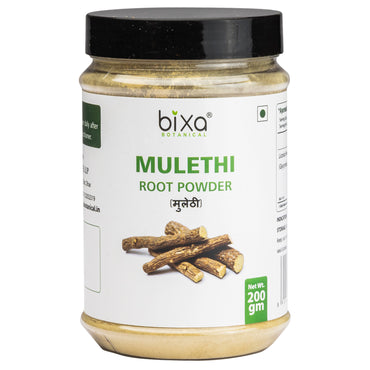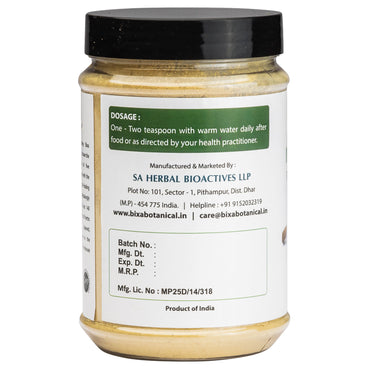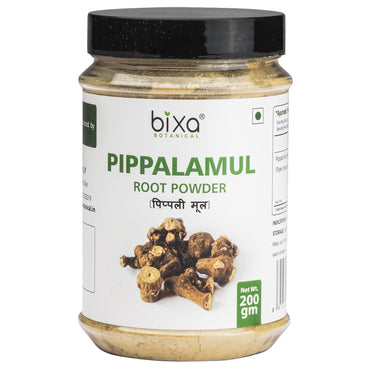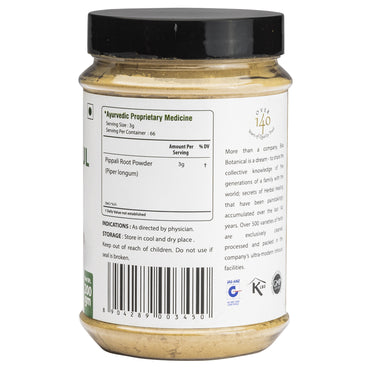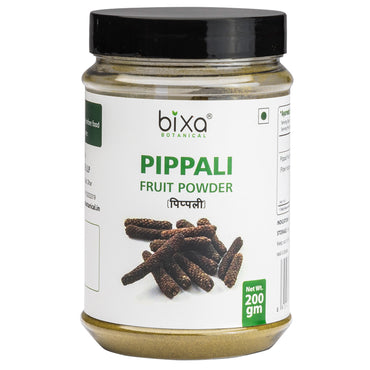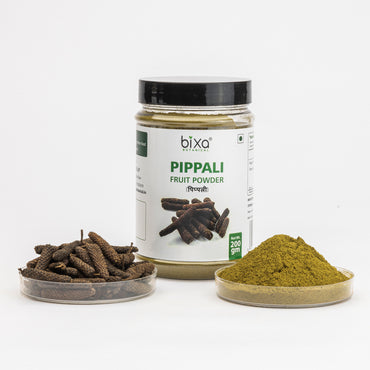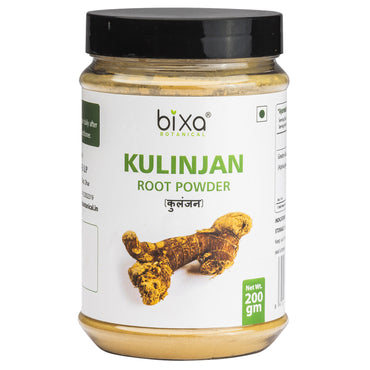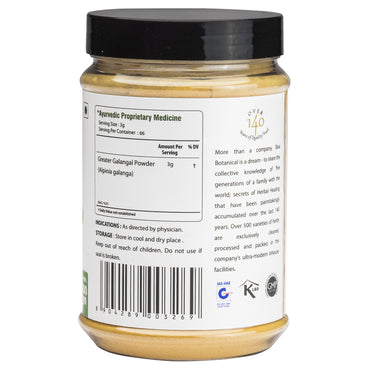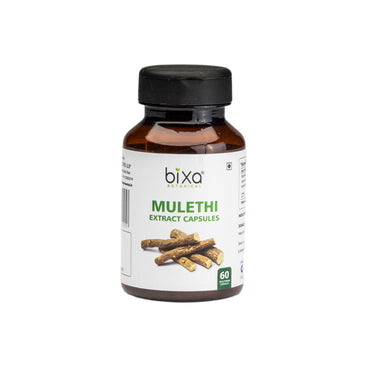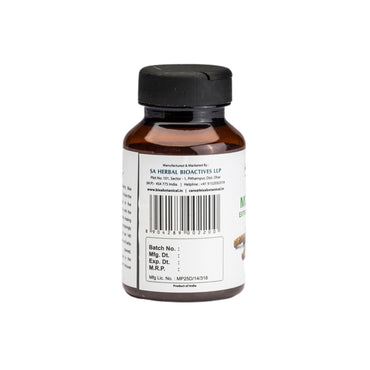
₹ 325.00
₹ 345.00
Supports Respiratory wellness. Supports as Anti-oxidant and immunity booster. Supports relief from sore throat, Cough and as Expectorant. Promotes reduction in Hyperacidity & as Mild Laxative. Liquorice, or licorice, is the root of Glycyrrhiza glabra herb from which a sweet flavour can be extracted (named Glycyrrhizin) and is commonly called as Jesthimadh or Mulethi. The word liquorice is derived (via the Old French licoresse) from the Greek glukurrhiza, meaning "sweet root". Liquorice flavours are used as candies or sweeteners, particularly in some European and Middle Eastern countries. Liquorice extracts have a number of medical uses, and they are also used in herbal and folk medications. Hundreds of potentially healing substances have been identified in liquorice as well, including compounds called flavonoids, Glycyrrhizin and various plant estrogens (phytoestrogens). Scientific Study conducted suggests that Licorice or Mulethi Extract prevents the breakdown of body's primary stress-fighting agents, like adrenaline, making these more available...
Supports Respiratory wellness. Supports as Anti-oxidant and immunity booster. Supports relief from sore throat, Cough and as Expectorant. Promotes reduction...
₹ 595.00
Supports Digestive & Respiratory Health Supports healthy Liver functions Supports healthy blood circulation Supports relaxation of tissues & nerves Pippali, Pimpali or Piper Longum (Latin, linn) is an indigenous plant to North- eastern & southern india and Ceylon, cultivated in Eastern Bengal. Pippali is the term applied to the fruit of piper longum and pippali mool to roots of piper longum plant. Pippali Mool has milder effects than Pippali & is available in small cylindrical pieces of nodal and internodal pieces, about 2 mm thick. Ayurveda mentions uses of pippali roots as anti-inflammatory, pain killing, for reducing abdominal gases, as laxative, and expectorant. As per Ayurvedic principle Pippali mool is hot in potency, and used to handle diseases that occur due to vitiation of Vata (air), and Kapha (phlegm) Dosha/humour. In Ayurvedic text it is mentioned that due to hot potency the roots are used in digestive weakness, and promoting respiratory...
Supports Digestive & Respiratory Health Supports healthy Liver functions Supports healthy blood circulation Supports relaxation of tissues & nerves Pippali,...
₹ 595.00
Supports as Respiratory & Digestive Tonic Promotes removal of inflammation and extra mucous from repsiratory tract. Supports Healthy Digestive & Immune System Supports de-toxification of Liver & Lungs Pippali, Pimpali or Piper Longum (Latin, linn) is an indigenous plant to North- eastern & southern india and Ceylon, cultivated in Eastern Bengal. Pippali is the term applied to the fruit of piper longum. Pippali is a powerful Rejuvenating herb that strengthens and nourishes the body. Piper Longum is useful in various ailments especially of respiratory tract, digestive system, genital system, Skin, Liver & spleen. As per Ayurvedic textual reference Pippali is better for Vitiated Vatta, Kapha of the body & is hot, pungent in quality. From ancient time Pippali Powder when taken with honey is found useful for removing extra phlegm, relieve cough & cold, sore throat & hiccups. Ayurveda also mentions utility of Pippali Powder with Jaggery (twice in quantity)...
Supports as Respiratory & Digestive Tonic Promotes removal of inflammation and extra mucous from repsiratory tract. Supports Healthy Digestive &...
₹ 405.00
₹ 425.00
Supports healthy Stomach and respiratory functions Supports as antioxidant & natural aphrodisiac Helps to promote sugar control & urine incontinence Supports to control bad breadth & toothache when applied on gums Kulinjan / Mahabharivach / Greater galangal [Botanical Name: Alpinia galangal], a plant in the ginger family, is an herb used in cooking in Southeast Asia. Kulanjan or greater galangal tree is found commonly in South India and Bengal province. The dried rhizome of kulanjan is pulverized to obtain the Powder which is used extensively for several medicinal purposes. Kulanjan herb is highly aromatic that contains very strong spicy flavour. As per Ayurveda Kulanjan is hot in potency which helps to reduce phlegm and clear airways for proper respiration. Kulinjan may help to reduce sore throat and support broncho-dialation, to reduce chest congestion. Ayurveda recommends using greater galangal for oral and voicing problems. Ayurveda says Kulinjan is useful to pacify...
Supports healthy Stomach and respiratory functions Supports as antioxidant & natural aphrodisiac Helps to promote sugar control & urine incontinence...
₹ 499.00
₹ 552.00
Supports Respiratory wellness. Useful as Anti-oxidants and immunity booster. Useful in sore throat, Cough and as Expectorant. Useful in Acidity & as Mild Laxative. Lab tested for quality, Non-GMO, vegan & gluten free Licorice Root Extract or Liquorice, is the root of Glycyrrhiza glabra herb from which a sweet flavour can be extracted (named Glycyrrhizin) and is commonly called as Jesthimadh or Mulethi. The word licorice is derived (via the Old French licoresse) from the Greek glukurrhiza, meaning "sweet root". Licorice flavours are used as candies or sweeteners, particularly in some European and Middle Eastern countries. Liquorice extracts have a number of medical uses, and they are also used in herbal and folk medications. Hundreds of potentially healing substances have been identified in liquorice as well, including compounds called flavonoids, Glycyrrhizin and various plant estrogens (phytoestrogens).Scientific Study conducted suggests that Licorice Extract or Mulethi Extract prevents the breakdown of body's...
Supports Respiratory wellness. Useful as Anti-oxidants and immunity booster. Useful in sore throat, Cough and as Expectorant. Useful in Acidity...
-
Previous
- Page 1 of 1
-
Next
Description
RESPIRATORY WELLNESS:
The Respiratory System - The respiratory system is the organs and other parts of your body involved in breathing, when you exchange oxygen and carbon dioxide.Your respiratory system includes your - Nose and nasal cavity, Sinuses, Mouth, Throat (pharynx), Voice box (larynx), Windpipe, (trachea), Diaphragm, Lungs, Bronchial tubes/bronchi, Bronchioles, Air sacs (alveoli), &Capillaries
Breathing System Flow - Breathing starts when you inhale air into your nose or mouth. It travels down the back of your throat and into your windpipe, which is divided into air passages called bronchial tubes.For your lungs to perform their best, these airways need to be open. They should be free from inflammation or swelling and extra mucus.As the bronchial tubes pass through your lungs, they divide into smaller air passages called bronchioles. The bronchioles end in tiny balloon-like air sacs called alveoli. Your body has about 600 million alveoli.The alveoli are surrounded by a mesh of tiny blood vessels called capillaries. Here, oxygen from inhaled air passes into your blood.After absorbing oxygen, blood goes to your heart. Your heart then pumps it through your body to the cells of your tissues and organs.As the cells use the oxygen, they make carbon dioxide that goes into your blood. Your blood then carries the carbon dioxide back to your lungs, where it’s removed from your body when you exhale.
Inhalation and Exhalation - Inhalation and exhalation are how your body brings in oxygen and gets rid of carbon dioxide. The process gets help from a large dome-shaped muscle under your lungs called the diaphragm.When you breathe in, your diaphragm pulls downward, creating a vacuum that causes a rush of air into your lungs.The opposite happens with exhalation: Your diaphragm relaxes upward, pushing on your lungs, allowing them to deflate.
How Does the Respiratory System Clean the Air? Your respiratory system has built-in methods to keep harmful things in the air from entering your lungs.Hairs in your nose help filter out large particles. Tiny hairs, called cilia, along your air passages move in a sweeping motion to keep the passages clean. But if you breathe in harmful things like cigarette smoke, the cilia can stop working. This can lead to health problems like bronchitis.Cells in your trachea and bronchial tubes make mucus that keeps air passages moist and helps keep things like dust, bacteria and viruses, and allergy-causing things out of your lungs.
How can I keep my respiratory system healthy?
- Being able to clear mucus out of the lungs and airways is important for respiratory health.- To keep your respiratory system healthy, you should:
- Avoid pollutants that can damage your airways, including secondhand smoke, chemicals, and radioactive gases. Wear a mask if you are exposed to fumes, dust or other types of pollutants for any reason.
- Avoid smoking yourself. Don't smoke.
- Eat a healthy diet with lots of fruits and vegetables and drink water to stay hydrated
- Exercise regularly to keep your lungs healthy.
- Prevent infections by washing your hands with soap water for 20 seconds often, do steaming regularly, gargling with warm water (add little salt & turmeric).
- Staying calm is essential to not only your mental health but your respiratory health. Stress and anxiety can cause rapid breathing and shortness of breath.
- Meditate and practice deep breathing exercises.
- Exercise-Get your body moving! Exercise releases endorphins that reduce the effects of stress and can improve your mood!
- Use Essential Oils& Herbal teas - Certain essential oils contain elements have immune boosting and protecting properties, like- Eucalyptus Globulus is widely known for its ability to reduce or eliminate harmful surface and airborne bacteria, and infections upon contact. Eucalyptus Globulus has anti-inflammatory, antispasmodic, decongestant, deodorant, antiseptic, antibacterial, and stimulating qualities, among other valuable properties.
- Rosemary Oil is known to support the respiratory system and reduce stress levels.
- Eucalyptus Radiata has been known to help provide relief from respiratory ailments such as asthma, bronchitis and upper respiratory colds.
- Lemongrass tea – helps to clear airways, reduce inflammation and to dilate bronchioles.
- Reduce Inflammation -Lung inflammation can cause tight airways, restricting proper breathing. Inflammation can be reduced by incorporating anti-inflammatory foods into your diet such as the following. Like-
- Omega-3 Fatty Acids: Salmon, tuna, walnuts or chia seeds.
- Vitamin E: Dark leafy greens are extremely high in this such as; collards, spinach, and kale.
- High antioxidants: Blueberries, nuts, strawberries and goji berries.
- Reduce your processed sugar intake! High sugar diets have been linked to high inflammation in the body.
- Drink a lot of water! Increasing your water intake can help reduce the mucus that accumulates in your lungs on a daily basis. The build-up of mucus can restrict your airways.
FAQ's
Q. What are Herbal powders?
The useful part of Herbs or medicinal plant is selected, dried, powdered & sieved to 40 or 60 mesh. They can be easily stored and transported.
Q. How effective are Herbal Powders?
They are very effective and fast acting if taken as recommended for particular illness and in correct dosage, as suggested by health practitioner. The result may be seen within 5-7 days.
Q. What is the Shelf life of Herbal Powders?
Generally dried powdered herbs if stored properly never get spoiled or damaged. They may be less effective after 5 years of manufacturing.
Q. What are the importance of Herbal medicines?
Herbal medicines are derived from Natural, Pure Herbs with Natural origin. They work as per their content of natural, pure Bio-active substances (Glucosides), which are not chemicals and not artificially induced! Hence no side-effects of Herbal Medicines, if taken in recommended dosage and for specific illness, Like – Vasaka or Adhatoda Powder very good for Respiratory wellness.
Q. Can you make tea from powdered herbs?
Teas can be made by pouring 1 cup of boiling water over 1–2 teaspoons of dried herbs. Cover and let tea steep for 5 minutes or so (roots and bark take longer). Then filter or decant the upper Tea solution and drink.
Q. How you can say, Your Respiratory system is good?
If there is no breathlessness while doing your normal routine work, if there is no early morning dyspnoea, if you can hold your breath minimum for 15-20 seconds, if you can walk minimum about 1500 meters without breathlessness, then you can say that Respiratory system good!
Q. How can you judge that your Respiratory system is not working properly?
If you have regularly breathlessness bouts, if you cannot walk for 10-15 minutes at one go, if you fall ill with cough & cold regularly, fatigue or extreme exhaustion without a logical reason, wheezing or gasping breath or chest congestion– are the signs that you should go for Respiratory health Check!
Q. How to boost your Respiratory wellness?
Avoid pollutants, avoid addictions especially smoking, Eat freshly cooked food, and avoid stress, anxiety; stay calm, meditate, do breathing exercises, walk regularly, use herbal teas, essential oils, have omega 3 oils, drink lot of water.
Q. Herbs good for Respiratory wellness?
Vasaka, Licorice, Calamus, Piper longum, Greater galangal, Turmeric, Holy basil.


